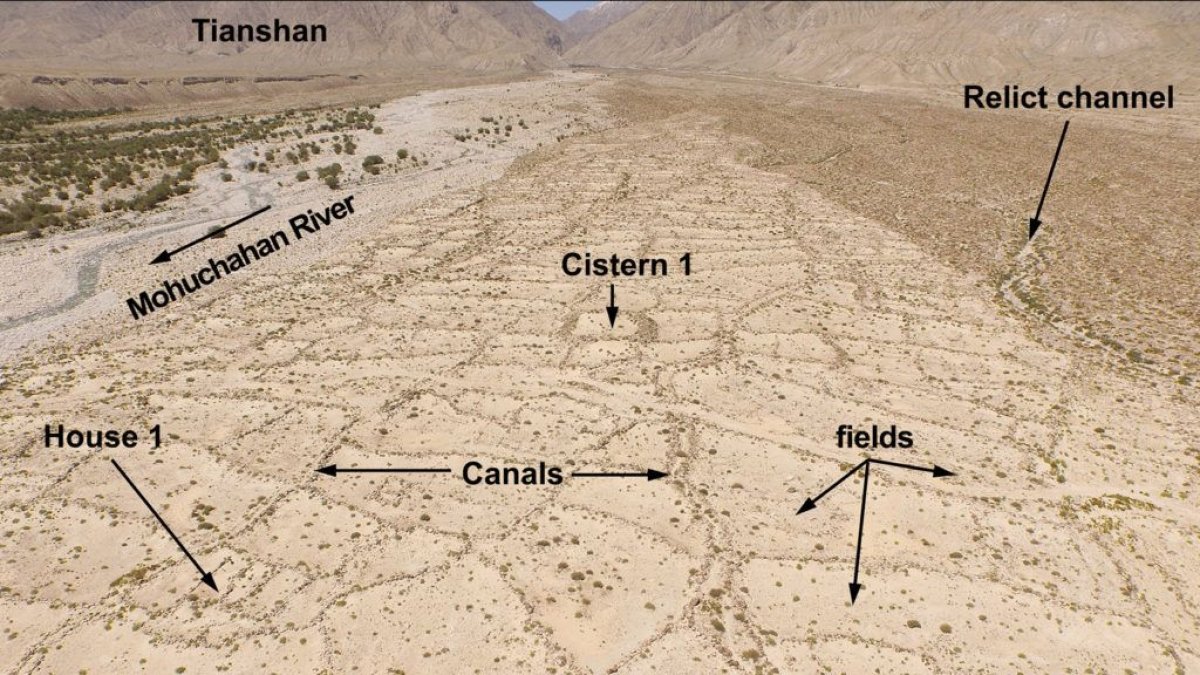
Archaeologists have discovered an ancient irrigation system in northwestern China that explains how the region's herding communities were able grow crops in one of the driest climates anywhere in the world. The system, dated to around the 3rd or 4th century A.D. and lost for centuries, lies in the foothills of the Tian Shan Mountains—part of the central corridor of the prehistoric Silk Road.
A team of archaeologists from Washington University in St. Louis made the discovery using data from drone and satellite imagery. They found "unmistakable outlines" of irrigation canals, cisterns and check dams (smaller, more makeshift-style dams), according to a university press release. They believe it's possible that the knowledge required to build such irrigation systems originated with early communities such as these, traveling along the corridor to Xinjiang province the same way crops did.
The team analyzed satellite imagery from the university's Spatial Analysis, Interpretation and Exploration laboratory and studied a region called MGK—named for the nearby Mohuchahan Valley, according to the university press release. They then mapped the site in greater detail using a consumer-grade quadrocopter drone, as well as cutting-edge photogrammetry software that created a comprehensive 3D model of the site by stitching together roughly 2,000 geotagged aerial photos, according to the press release. A paper describing the research was published in the journal Archaeological Research in Asia.
"There are numerous studies on the crops that probably spread through the Silk Road and the prehistoric Silk Road," corresponding author Yuqi Li, an archaeology graduate student in the university's Department of Anthropology, told Newsweek via email. "Wheat and millets (foxtail and broomcorn) were probably the most important crops to understand trade and exchange along the prehistoric Silk Road. All of them are staple crops, so they had a large impact on people' diet."
Recent research has revealed that Central Asian communities archaeologists had considered pastoralist or nomadic also practiced agriculture, leading Li and colleagues to find the term "agropastoralist" a more accurate descriptor.

The irrigation system is smaller than other Han dynasty systems in the region. Li told Newsweek that the biggest insight he felt he gained from the research was that ancient Central Asian agropastoralist societies might have lived a more sustainable lifestyle than Han dynasty colonists, and that their irrigation technologies were more adaptive than those that the Han troops introduced to Xinjiang.
"The systems built by the local agropastoralists were oriented towards conservation and efficiency," Li wrote to Newsweek. "They were built in an energetically conservative way and they emphasized water storage rather than constant supply of water. The Han dynasty systems, however, were oriented towards maximizing the water supply with much less consideration of the labor cost and the efficiency of water use."
Uncommon Knowledge
Newsweek is committed to challenging conventional wisdom and finding connections in the search for common ground.
Newsweek is committed to challenging conventional wisdom and finding connections in the search for common ground.
About the writer
Kastalia Medrano is a Manhattan-based journalist whose writing has appeared at outlets like Pacific Standard, VICE, National Geographic, the Paris Review Daily, ... Read more
To read how Newsweek uses AI as a newsroom tool, Click here.








